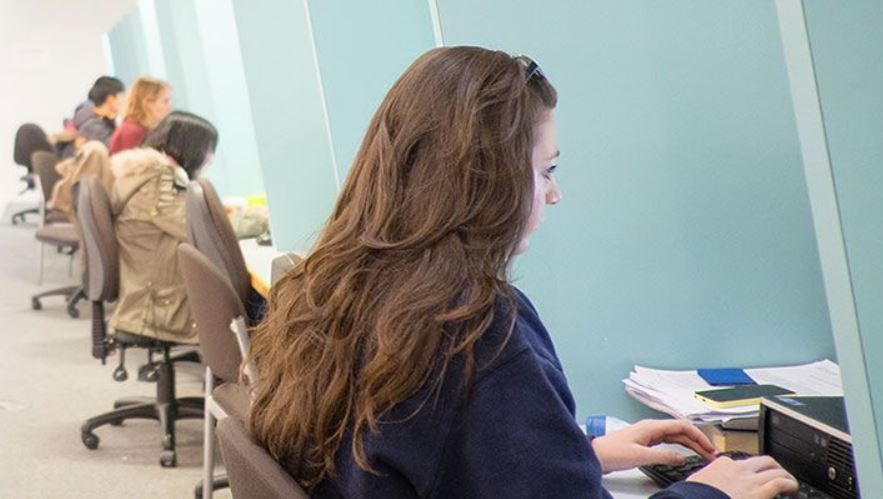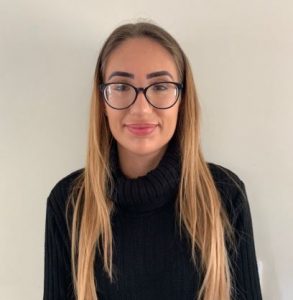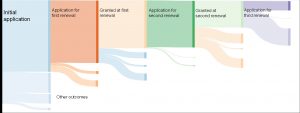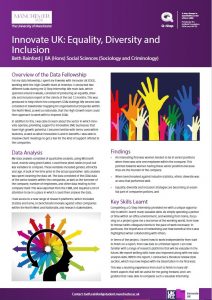
An Overview of my Q-Step Experience
 By Amy Tyley
By Amy Tyley
For my 2021 remote data fellowship I spent 8 weeks working with the Protection, Asylum, and Resettlement Integration team within the Home Office. I worked on one large data analysis project for the duration, and had the opportunity to engage in many other roles throughout my time there. Alongside the data analysis, I led an anti-racism training session for the wider team of around 30 people and volunteered to take meeting minutes for the monthly department board meeting. I learnt a lot in such a short space of time and I’m very grateful for the responsibilities I was trusted to take on.
A key feature of the experience was being able to set goals with my line manager, which were to be achieved by the end of the 8 week internship. One of my goals was that I wanted to know what I want to do post-graduation. From the start of my degree I showed strong interest in a governmental role, and after my line manager kindly set up 15+ meetings with colleagues across all departments and even some outside of the Home Office, I have a much clearer picture of where I want to go once I graduate.
For the data analysis of my project, I used SAS and Excel to filter a very large dataset (180,000 rows), into a more manageable and appropriate cohort of customers for my research question.
Using migrant journey data from over the past decade, I studied the renewal journeys that migrants typically follow and what patterns may exist with these journeys i.e. likelihood of switching routes at certain times. Although I had never used SAS before, it used the same SPSS coding structure that I had experience with from my university courses. The Home Office provided me with several training courses and introductory videos before beginning the analysis, to boost my confidence and consolidate my knowledge. Some of the new code I learnt included, using the lag function, left-joins and ‘if-then’ statements. My task was to go away and learn these before coding them to the data, all code used for analysis was written from scratch. One of my favourite parts of the data fellowship was being able to present my work to the department and show just how hard I had worked over the previous 8 weeks. I put together a word-report and a summary PowerPoint presentation explaining the decisions made during the analysis, why they were made and how they further impacted our results/ability to answer the research questions.
My data fellowship taught me so much, not just analytical skills but general life skills and the importance of being able to adapt to the working environment. One key skill I picked up was the ability to judge when appropriate to ask for help, a skill I never thought would need to be learned. I now understand the importance of working productively, and sometimes it’s not an appropriate use of my time to sit, trialling and erroring code for hours when my internship time is limited, and I have SAS Software experts on my team. I didn’t go into my fellowship with any specific expectations, but it has definitely been a very enlightening process into the demands of the world of work, grossly improving my adaptability skills. I have a newfound appreciation for working under time constraints and being able to prioritise tasks. I thoroughly enjoyed my time at the Home Office and would strongly recommend applying for the Q-Step programme if eligible.

 By Beth Rainford
By Beth Rainford
My name is Beth and I am a third year Sociology and Criminology student studying on the BASS programme. I completed a Q-Step internship over summer 2021 with Innovate UK EDGE, hosted by Inventya. I worked within the High Growth team, which works to scale up innovative small businesses. My role consisted of analysing the equality, diversity, and inclusion data of the companies that Innovate had supported over the last 12 months to assist with the creation of an ED&I strategy. In addition, I mapped stakeholders for possible organisations Innovate could work with to help improve ED&I within the companies they work with, as well as within their own organisation.
During the 8 weeks I spent with Innovate, I had a hybrid way of working. I got a feel for a 9-5 style job both within an office environment and online, and how collaboration in both settings happened. My main task was producing a report for Innovate so they could have an understanding on their ED&I performance in relation to other companies. This was carried out mainly on Excel, conducting quantitative analysis which enhanced my skills on the programme. I also had the opportunity to explore and use other research platforms that I would not have had access to previously, to research stakeholders in the Northwest and Nationally. Completing this project enabled me to work independently from start to finish on a report, from raw data to a finalised written report. This enhanced my ability to not only analyse data, but skills to write this up. I found this has helped in my third year with my dissertation, as I wrote a literature review for this report, which was great practice for when it came round to doing this for my dissertation. In addition, I made some great connections within the company that have been very supportive both during and after my internship.
I applied for a Q-Step internship as it provided full time work over summer (which paid the living wage!) and provided relevant experience that I knew would be valuable going into a competitive graduate job market. The compulsory data module in my second year opened my eyes to how I could combine data with social sciences, so Q-Step was a great way to explore this more, and ultimately helped me explore a career path I could possibly go down. For me, Q-Step led me to decide to continue studying here at Manchester, and I will be completing a Master’s Degree in Social Research Methods and Statistics from September.







0 Comments